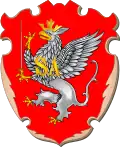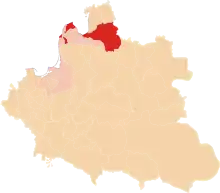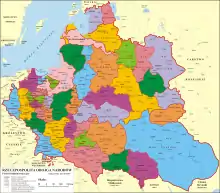Wenden Voivodeship
Wenden Voivodeship (Polish: Województwo wendeńskie)[1] was a unit of administrative division and local government in the Duchy of Livonia, part of the Polish–Lithuanian Commonwealth. It was formed in 1598 by King Zygmunt III Waza, out of Wenden Presidency (Province), which had been created in 1582 by King Stefan Batory, after the Truce of Jam Zapolski. The voivodeship remained in the Commonwealth until the Swedish Empire's conquest of the Livonia in the 1620s. The remainder of Polish Livonia was named Inflanty Voivodeship, and continued to be part of the Commonwealth until the first partition of Poland in 1772.
| Wenden Voivodeship Województwo wendeńskie | |||||||||
|---|---|---|---|---|---|---|---|---|---|
| Voivodeship of Livonia1 | |||||||||
| 1598–1621 | |||||||||
 Coat of arms
| |||||||||
 Wenden Voivodeship in the Duchy of Livonia. | |||||||||
| Capital | Wenden | ||||||||
| Area | |||||||||
• | 30,000 km2 (12,000 sq mi) | ||||||||
| History | |||||||||
• Established | 1598 | ||||||||
| 1621 | |||||||||
| |||||||||
| 1 The Duchy of Livonia was a vassal to the Grand Duchy of Lithuania until the Union of Lublin in 1569, and after that a part of the Polish–Lithuanian Commonwealth. | |||||||||
Officially, Wenden Voivodeship belonged to Poland - Lithuania until the 1660 Treaty of Oliwa. Its capital was at the town of Wenden (Polish: Kies), where local sejmiks of the nobility (see szlachta) took place. Wenden Voivodeship elected two deputies to the Polish - Lithuanian Parliament (Sejm). Even though it no longer belonged to the Commonwealth after the Swedish conquest, its voivodes continued to be named by Polish kings until the final partition of Poland (1795), as the so-called "fictitious titles" (Polish: urzędy fikcyjne).
Major cities, towns and castles of Wenden Voivodeship were: Cēsis (Kies, Wenden), Riga, Koknese (Kokenhausen), Salaspils (Kircholm), Daugavpils (Dyneburg), Rēzekne (Rzezyca, Rositten), Viļaka (Marienhausen), Gulbene (Schwanenburg), Ludza (Lucyn), Krustpils (Kreutzburg).
Voivodes of Wenden
The seat of the voivode was Wenden (Cēsis).
- 1598–1602 Jürgen von Farensbach
- 1620–1622 Teodor Denhoff
- 1627–1641 Joachim Tarnowski
- 1641–1643 Tomasz Sapieha
- 1643–1648 Gerard Denhoff
- (died 1659) Nikolaus Korff
References
- Niesiecki, Kasper (1846). Herbarz polski Kaspra Niesieckiego (in Polish). Waif. p. 228.
